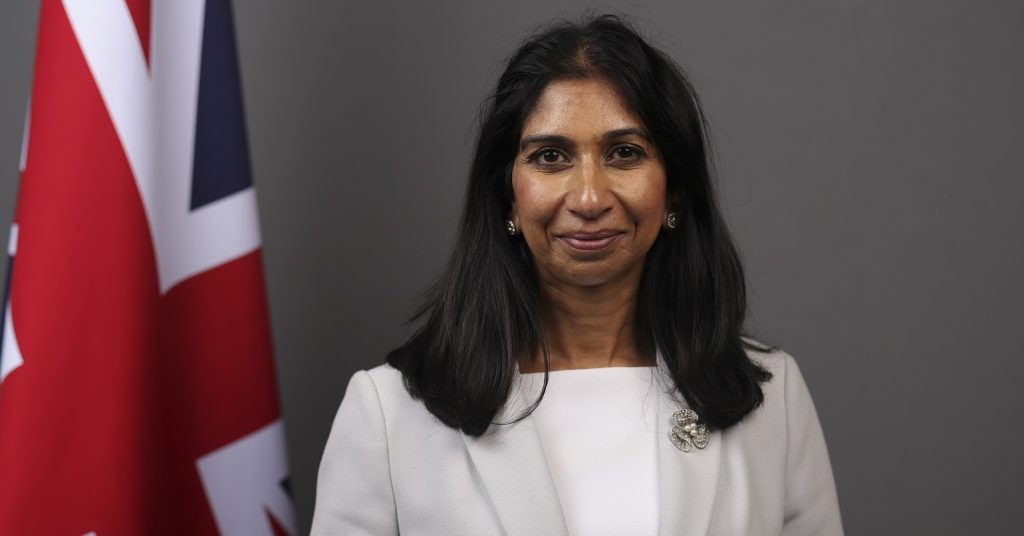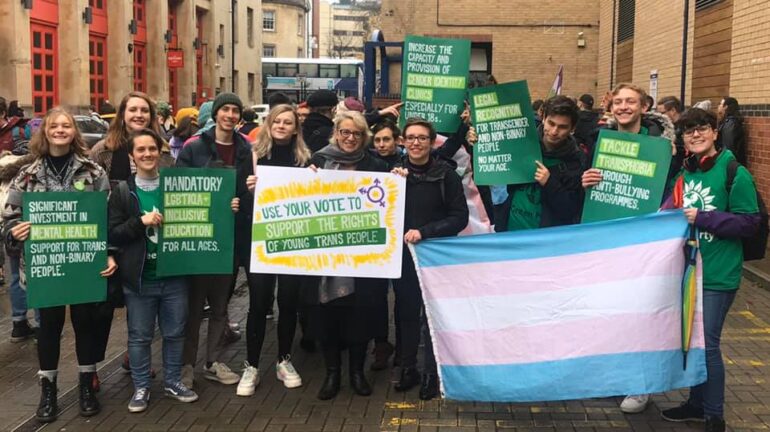Why Theresa May's immigration proposals are a feminist issue
One of big news stories this week is that Home Secretary Theresa May has been briefing MPs on proposals to introduce a minimum income requirement for UK citizens who want their spouse from outside of the EU to live with them in this country. As part of the Coalition government’s drive to reduce immigration, anyone with an annual salary of less than £25,700 – or more if they have children – could be denied the right to settle down in their home country with the person they love.
Setting an income requirement means that the government are essentially telling some people that they are too poor to marry the partner of their choice in this country. The figure of £25,700 isn’t an extravagant wage; it is “average”, but this means that well over half of population earns less. It’s a little over twice the minimum wage, and more than the starting salary for newly qualified teachers or nurses. Up to 60% of the family visas issued last year would have been refused had this rule been applied.
At first glance, this might look like the government are simply further entrenching economic privilege, but when you look closer, it becomes clear that these proposals are a trainwreck of intersecting discrimination. The other proposed new conditions on family and spouse visas – namely that the foreign spouse must speak English, have an “attachment” to the UK, and that the couple should have an established relationship – appear to be aimed at preventing people of South Asian ethnicity from entering an arranged marriage with someone from the country their family emigrated from. It discriminates against same-sex couples, whose relationship may not be recognised in the non-British partner’s home country, giving them no grounds to apply for a spouse’s visa there. If the British partner becomes disabled due to an accident or illness and can no longer work, they could be forced to move to another country where appropriate medical treatment might be difficult to obtain, or could leave them bankrupt.
Like many of the current Westminster government’s policies, this is also an issue for feminists, because it has the potential to affect women more harshly than men. First of all, the gender pay gap means that it would be more difficult for a woman to earn enough to sponsor her foreign partner’s visa. But, more worryingly, it could be used to restrict women’s reproductive rights: the minimum income requirement is not static, but increases with the number of children that the couple is responsible for supporting. For some couples, staying together in the UK could be contingent on them not having children until the government decrees that they can afford them.
This means is that the government would be able to decide whether a couple should be allowed to raise a child in this country, based solely on their income and one partner’s place of birth. As it’s generally women who do the childbearing, this gives the government an unusual level of influence in individual women’s decisions about reproduction. Some couples might try to work around this in planning when to start trying the have children, but there’s no such thing as an infallible contraceptive, and just because a pregnancy wasn’t planned doesn’t mean that it isn’t ultimately wanted. What happens to the woman who unexpectedly finds herself pregnant when she doesn’t meet the income requirement to support a child, or the woman who has been told that her family can support one child, but ends up expecting twins? Would they be forced to choose between abortion and exile?
What a woman chooses to do with her uterus (if she has one) is a very personal decision, and supporting a woman’s right to continue her pregnancy is the other side of the pro-choice coin. Essentially, we’re arguing for a woman’s right to make decisions about her body and her future, but the choice is made less freely if the government tells her that one of her options will lead to her family’s permission to stay in this country being revoked.
While UK-born women with partners from overseas will suffer the stress of trying to maintain sufficiently well-paid employment in spite of the gender pay gap, and take the bare minimum of maternity leave so that it doesn’t affect their earnings, it is immigrant women with British partners who will arguably be worst affected. At the moment, spouse visas are initially granted for a two-year period before they become permanent, during which time they have no recourse to public funds; under the new proposals, the probationary period would be extended for up to five years. Someone who has no recourse to public funds is not allowed to claim benefits, or use certain public or voluntary sector services receiving state funds, including support for people experiencing domestic abuse (the overwhelming majority of whom are women in relationships with men).
Someone who would be made destitute by leaving an abusive relationship can apply to the Home Office for a special immigration status that allows her temporary access to refuges and other support services for up to three months. However, because there are additional bureaucratic hoops to jump through, it means that support isn’t available as quickly or as easily as it would be for an EU citizen or someone with indefinite leave to remain. These additional barriers to getting support could mean that some women feel forced to stay in an abusive relationship until their immigration status changes. Making spouses wait for five years to have “recourse to public funds” is likely to prolong some women’s suffering, and could increase the risk that they will become one of the two women a week who are murdered by their current or former partner.
This desperate attempt to reduce the level of migration into the UK sets a horrible precedent by putting a price tag on love and reproductive rights. The idea that your rights should be dependent on your income is abhorrent, but it seems to fit perfectly into the current government’s agenda.




There’s certainly a great deal to learn about this subject.
I like all of the points you made.
my county is not save for my wife and kid whom are british citizens as kipnapping is now the other of the day. may wants me to take my family back to my county because my wife dont earn £18600 and a savings of £16000 sitting in her bank this is inhuman. my friend is married to a polish woman but can enter the uk any how he wants without showing how much they got in there accounts so the EU citizens now has rights more than a born british citizens.
There are over one million visas issued each year for people coming to the UK. Only about 30,000 of these are issued to family members coming to settle in the UK. So even reducing the number of family immigrants by half is not exactly going to have a massive effect on immigration. There are also a large number of EU citizens who come to the UK to work or to claim benefits. These people do not require any sort of visa so they are not influenced by these financial rules no matter how draconian. So the UK governments rules are not fit for purpose. What is the government going to do about it???
I would urge everyone to not give up on their relationship, this is yet another attack on the low earners. campaign against these rule changes by writing to your local MP regarding your situation and also write to Chris Bryant @ bryantc@parliament.uk. He is Labours Shadow Immigration Minister and he is relying on us so that he can challange the Conservatives on this ridiculous rule. How dare they put a price tag on genuine relationships, what will be next, we have to pay tax on love. Theresa May should step down, she is clearly incompetent and out of her depth. Also, she is a racist pig. E-mail me @ c.ward.88@hotmail.co.uk, we must fight and win this battle, fuelled by LOVE.
I agree with Alyson’s statement… I work part time because I have an 11 year old daughter and have severe health issues. I got married in November 2011 and my husband is Tunisian. Under the old rules I could put forward my application on the basis that when my husband is here to support me, I can earn more, but under these new rules it doesn’t look like that will be possible.
*(above) blatant (sorry!) not “blatent”!
Even if it doesn`t affect someone you know at the moment, do you really one day want your son or daughter forced overseas because the person they met, fell in love with and got engaged to while overseas cannot come with them to live at home in the UK?
We have been married 10 years. My non-EEU husband could be offered a 200,000 pound job in the UK. We could have savings of that much in the bank account. But because I, as the British citizen in our marriage, am a stay at home Mum to our three children right now, and therefore cannot possibly earn the income threshold Ms May is proposing, we are deemed not able to support ourselves!
This is clear and blatent discrimination against British women who have dared to marry outside what the government deems to be “acceptable borders”.
I’m currently fronting a Facebook campaign against the proposed changes. We have nearly 200 “likes” in the week we’ve been set up. Please visit and “like” our page if you support this cause or if it affects you or someone you know.
https://www.facebook.com/BritsAgainstFamilyExile
Such important points – particularly about the income requirement. Why can’t the prospective partner show that they have a job lined up in the UK? I really hope this will be challenged as discrimination of private and family life or perhaps under the UN women rights convention’s optional protocol.
On the no recourse point, the new DDV concession currently appears to be working really well (like a couple of days to get access to benefits), but there are still issues about a) people not knowing about the concession and b) the strong evidence of DV the person needs to get permanent leave.
Great points – keep pushing them.
I don’t think this is purely a feminist issue by any means, but I’d noticed that the commentary so far was concentrated on the racist and classist aspects of the immigration proposals – which are, obviously, very important – and thought it was worth adding this to the discussion.
Let’s face it the immigration policies are also discriminatory to those who are disabled, lgbt and black/ethnic. Personally, I think it’s more a class and race issue. I think more needs to be said on those contexts rather than purely on a feminism.But good blog overall.